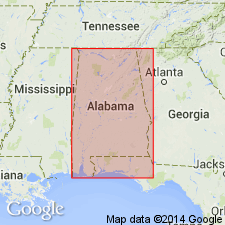
- Usage in publication:
-
- Wedowee formation
- Modifications:
-
- Named
- Dominant lithology:
-
- Slate
- Phyllite
- Quartzite
- Schist
- AAPG geologic province:
-
- Piedmont-Blue Ridge province
Summary:
Name Wedowee formation is here applied to slates, phyllites, quartzites, and schists exposed at and around Wedowee, Randolph Co., east-central AL. Characterized in many places by occurrence of amorphous graphite, which accounts for black or grayish black color. Much of formation is without graphite but contains such metamorphic minerals as mica, garnet, staurolite, and cyanite. No calcareous rocks have been found in the formation. May comprise upward of 10,000 ft of variably altered sediment. The black graphitic phase reaches a thickness of 2,000 ft in places. Age tentatively placed from Carboniferous downward into Cambrian, but lower limit cannot be stated with an definiteness. [Other contemporary workers considered the unit to be Precambrian.]
Source: GNU records (USGS DDS-6; Reston GNULEX).
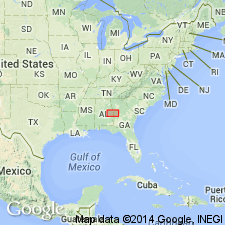
- Usage in publication:
-
- Wedowee Group
- Modifications:
-
- Revised
- Areal extent
- AAPG geologic province:
-
- Piedmont-Blue Ridge province
Summary:
Wedowee is here raised from Formation to Group rank and subdivided into Hackneyville spotted schist, Cragford Schist, and two unnamed metasedimentary units. Units are defined on the basis of the amount of graphite in the metasedimentary sequence and the degree of crystallinity of the aluminous material. Intruded(?) by 11 small pod-shaped stocks, here referred to as Almond Granites. Greater part of the Wedowee Group is represented by the two metasedimentary sequences that underlie parts of Randolph Co., AL, and Carroll and Heard Cos., GA. The Wedowee, a ridge former, is exposed over most of the Coosa block and for nearly 100 mi along the north-west side of the Tallapoosa block. It is one of the most widespread units in the metamorphic terrane northwest of the Brevard zone in AL.
Source: GNU records (USGS DDS-6; Reston GNULEX).
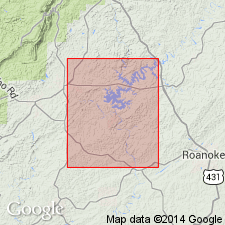
- Usage in publication:
-
- Wedowee Group
- Modifications:
-
- Revised
- AAPG geologic province:
-
- Piedmont-Blue Ridge province
Summary:
Metasedimentary rock of the Wedowee Group forms the most areally extensive and the youngest stratigraphic unit in the Crooked Creek area. Original sedimentary column of the Wedowee can be divided into an upper and lower stratigraphic sequence. The lower sequence has been mapped here as the Cragford Phyllite (new). The Cragford is overlain by the Cutnose Formation (new) which forms the stratigraphic top of the Wedowee as it is recognized in this report. Metamorphic and tectonic derivatives of these two recognize units include the Hackneyville Schist and the Cornhouse Schist (new). The Wedowee is in fault contact with Hatchet Creek Group (new). Age generalized as Precambrian to late Paleozoic.
Source: GNU records (USGS DDS-6; Reston GNULEX).
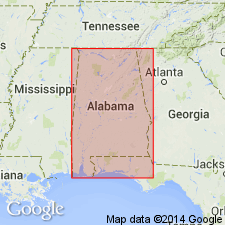
- Usage in publication:
-
- Wedowee Group
- Modifications:
-
- Revised
- Overview
- AAPG geologic province:
-
- Piedmont-Blue Ridge province
Summary:
Wedowee Group consists of graphitic schist, phyllite, and phyllonite. Metagraywacke and quartzite are common to rare. Includes Hackneyville Schist, Cutnose Gneiss, Cragford Phyllite, Beaverdam Amphibolite, and Cornhouse Schist. Generalized age of Precambrian to Paleozoic used on chart.
Source: GNU records (USGS DDS-6; Reston GNULEX).
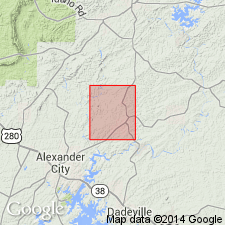
- Usage in publication:
-
- Wedowee Group
- Modifications:
-
- Age modified
- AAPG geologic province:
-
- Piedmont-Blue Ridge province
Summary:
Wedowee Group in the New Site quad. of east-central AL includes the Hackneyville Schist, the Cragford Phyllite and its informally named Enitachopco Creek quartzite member, and the Cutnose Gneiss. A minimum age of Late Cambrian to Middle Ordovician is established for the Wedowee based on intrusive contacts with the Elkahatchee Quartz Diorite Gneiss, which has been dated at 490+/-28 Ma by Russell and others (1987: Granites of Alabama: Alabama Geol. Survey, p. 239-250).
Source: GNU records (USGS DDS-6; Reston GNULEX).
For more information, please contact Nancy Stamm, Geologic Names Committee Secretary.
Asterisk (*) indicates published by U.S. Geological Survey authors.
"No current usage" (†) implies that a name has been abandoned or has fallen into disuse. Former usage and, if known, replacement name given in parentheses ( ).
Slash (/) indicates name conflicts with nomenclatural guidelines (CSN, 1933; ACSN, 1961, 1970; NACSN, 1983, 2005, 2021). May be explained within brackets ([ ]).

